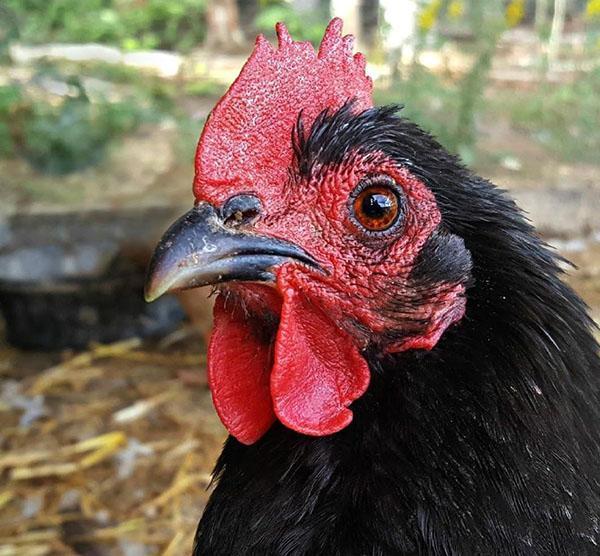Can you hear what I hear? All About Hearing Chickens
 Chickens hear as well as humans. They have two ears - one on each side of the head, the webbing, the outer, middle and inner ear, just like ours. They are able to pick up sound waves and transmit them to the inner ear.
Chickens hear as well as humans. They have two ears - one on each side of the head, the webbing, the outer, middle and inner ear, just like ours. They are able to pick up sound waves and transmit them to the inner ear.
 The ears of chickens are practically invisible, as they are covered with feathers. However, the earlobes are usually clearly visible. It is a myth that the color of the eggs in chickens can be determined by the color of the earlobes, although often, indeed, chickens with white earlobes lay white eggs, and brown ones with reddish brown ones. However, the blue egg-laying Ameraucana chickens do not have that color at all!
The ears of chickens are practically invisible, as they are covered with feathers. However, the earlobes are usually clearly visible. It is a myth that the color of the eggs in chickens can be determined by the color of the earlobes, although often, indeed, chickens with white earlobes lay white eggs, and brown ones with reddish brown ones. However, the blue egg-laying Ameraucana chickens do not have that color at all!
 Unlike humans, whose hearing tends to deteriorate with age, chickens are able to repair damaged hearing cells, so their hearing remains good throughout their lives. This is vital for chickens as they are at the low end of the food chain and any signal that a predator is approaching is critical to the bird. It is true that chickens can discern how far away a sound is from by judging how long it took for the sound to reach their ears.
Unlike humans, whose hearing tends to deteriorate with age, chickens are able to repair damaged hearing cells, so their hearing remains good throughout their lives. This is vital for chickens as they are at the low end of the food chain and any signal that a predator is approaching is critical to the bird. It is true that chickens can discern how far away a sound is from by judging how long it took for the sound to reach their ears.
 Chickens, while still in the egg, are able to hear the cackling of a brood hen. The embryo begins to pick up sounds around the 12th day of the incubation period. Having barely hatched, the chicken already reacts to the sounds that the chicken makes, looking for seeds or bugs in the ground. And if you tap your finger near the feed, the brood chick will rush to explore the area.
Chickens, while still in the egg, are able to hear the cackling of a brood hen. The embryo begins to pick up sounds around the 12th day of the incubation period. Having barely hatched, the chicken already reacts to the sounds that the chicken makes, looking for seeds or bugs in the ground. And if you tap your finger near the feed, the brood chick will rush to explore the area.
Based on my personal experience, I have found that chickens do not care about loud noises at all. They are not even afraid of fireworks. And when I built a chicken coop a few years ago using a power tool, they didn't even blink an eye. But a piece of tarpaulin flapping from the wind over their heads causes them to panic. My theory is that chickens do not associate loud sounds with danger, but the sounds of flapping tarpaulins resemble the flapping of the wings of a hawk, owl, or eagle.
Chickens seem to enjoy listening to classical music a lot. Research results have prompted some commercial farms to include classic pieces in chicken coops. They find that this calms down the dominant chickens in the flock, and therefore reduces behavioral problems. In addition, such music has a beneficial effect on the number (and size) of eggs in hens. So turn in Mozart and get ready to collect eggs!